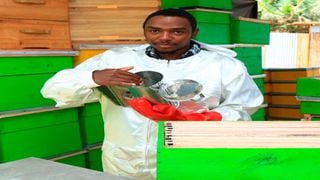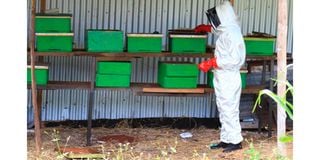
Bernard Kiruthu who keeps bees in an urban area in Nyeri.
Seeds of Gold
Premium
Sweet rewards from keeping bees in the backyard
A huge tract of land filled with trees and shrubs of various kinds, a river on the edge of the farm or cutting across it and a rural setting is what comes to mind when one thinks of beekeeping.
Ideally, bees need these conditions, as they have to forage for nectar and have a reliable supply of water, to thrive.
But do you know that you can comfortably keep bees in your balcony, at your office or on a small piece of land in an urban area and still earn handsome profits?
Bernard Kiruthu, 25, keeps his bees on eighth-acre in an urban setting in Kamakwa, Nyeri County.
The leased land hosts a house and a 24ft by 8ft apiary in which he keeps his 60 Langstroth beehives.
“I started the business at the end of 2018 as a hobby with a friend, Patrice Murungi, but I now run it singly, after she moved to start her own enterprise. We made three makeshift hives, attracted bees and then began selling honey when demand arose,” he recalls, noting they invested Sh6,000 that went on wood and nails that they used to make the hives after getting some training from a beekeeper.
Free from pests
To attract bees in the hive, Kiruthu says he did research on the insects.
“I found out that bees are always looking for a home that is warm and clean. Thus, we built the hives and ensured they were free from pests. We then put beeswax and lemongrass oil to attract the insects,” he says, adding he still uses the method to date.

Bernard Kiruthu displays a beehive.
Normally, according to him, a colony sends scout bees to inspect the hives and then report to the queen bee who decides on whether to relocate to the new home or not.
His hives have metal stands for longevity and he has placed sawdust in the apiary to keep it clean.
He places water in basins in the apiary for the bees to access it easily and they get nectar from nearby plants since residents in the area are farmers.
Kiruthu harvests at least 60 kilos of honey, four times each year, from his hives but during cold seasons, production declines.
“I sell a kilo of the honey at Sh900 or a 500g pack at Sh450 to neighbours and traders at the nearby town,” he says, noting he also harvests wax, jelly, venom and propolis for more cash.
“Honey is the most common product although bee venom is the most profitable. A kilo of royal jelly is Sh8,000 while a gram of bee venom is Sh2,500,” says Kiruthu, who got training from William Chira, a beekeeper in Nyeri.
He collects the venom using a bee-venom collector, which is used to disturb the animals that then produce it through their stings.
“But farmers are discouraged from harvesting the venom frequently as this may ultimately chase away the insects since bees don’t like noisy surroundings,” says Kiruthu.
The venom is used in beauty and pharmaceutical industries to manufacture cosmetics.
“It also has anti-inflammatory properties that help the body heal and prevent itself from harm. It is also known to reduce arthritis-related symptoms and neurological diseases like the parkisons”.

Bernard Kiruthu of Central Bee keepers explains the procedure of harvesting honey at Kamakwa in Nyeri County on March 15, 2021.
On the other hand, the royal jelly reduces menopausal symptoms while propolis is an antioxidant that helps heal wounds and fight bacteria.
“Currently, I sell to a foreigner who acts as a broker between myself and clients abroad. The broker helps in transporting the bee-venom to his clients abroad,” he says.
Training farmers
To expand his income, he makes hives and has since started training farmers under his business, The Central Beekeepers, where he teaches aspiring honey producers how to run a successful enterprise.
“There should only be one entry to the hive to prevent pests, especially the crawling and flying insects from invading the hive. The roof of the apiary should also have an opening which acts as a door for the insects,” Kiruthu says what he teaches his students.
One of his main challenges, he says, is the lack of machines in the country to test the quality of bee-venom.
“Some export companies mistake the product for an illegal drug because they don’t know of its existence. Again, I am normally asked to test and have the product approved by the Ministry of Agriculture before shipping but the country lacks such machines,” he says.
Commercial farming in the region has affected his business as farmers tend to spray chemicals on crops like watermelons, broccoli and apples that depend on pollination contaminating them.
“As they forage for nectar, the bees feed on the contaminated crops leading to their death or impure honey. Central is also very cold in certain seasons of the year forcing the bees to feed on the products they make.”

Bernard Kiruthu inspects bees in an apiary at Kamakwa in Nyeri County on March 15, 2021.
For instance, the queen bee feeds on the royal jelly made during the cold season reducing the quantity he collects.
According to him, the queen bee can easily be identified from the colony as she is big and heavy with smaller wings as compared to the rest.
Kiruthu says in case a beekeeper wants to transfer a colony, he should relocate the queen in an enclosed wiremesh hive then the colony will be forced to follow her.
Her only task in the family is to lay eggs, thus she only comes out of the hive to mate or during the swarm season.
She prepares for this by fasting for some time so that she can be able to fit out of the entrance of the hive.
So far, Kiruthu says he has not had any conflict with his neighbours due to the bees since he has secured the insects well.





